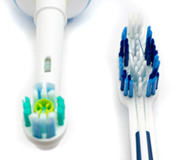Tooth Brushing
Brushing your teeth with fluoride toothpaste is arguably the most essential component to the maintenance of good oral health. Tooth brushing cleans and whitens your teeth, while helping prevent the onset of tooth decay and gum disease, one of the leading causes of tooth loss in adults. Removing tooth stains and avoiding bad breath are added benefits of tooth brushing.
Why We Brush: The Frontline of Oral Hygiene
The foods that we eat contain sugars and starches. When plaque – the sticky substance that forms on the teeth – combines with these sugars and starches, an acid is produced that attacks tooth enamel and causes tooth decay.

Dental plaque can also irritate the gums to the point that they become red, swollen, tender and can bleed easily. Gum irritation can lead to gingivitis, an oral condition that precedes gum disease (periodontitis). Gingivitis can be treated and reversed if it is diagnosed in its early stages. If plaque is not removed, the gums can eventually start to pull away (recede) from the teeth. When this happens, bacteria and pus-filled pockets can develop and the bone that supports the teeth can be destroyed. Once the bone is destroyed, the teeth will loosen and/or require removal.
Brushing your teeth removes plaque from the tooth surfaces while flossing removes plaque from in between the teeth. The American Dental Association recommends that you brush your teeth at least twice a day for about two minutes, preferably after eating.
Optimal Tooth Brushing Techniques
Brushing at least twice a day is an essential practice in maintaining good oral health; however, it is imperative that you brush your teeth properly. The following steps detail optimal brushing habits:
- Use a small amount of ADA-approved toothpaste.
- Hold the brush at a 45 degree angle.
- Use gentle and short strokes, moving your toothbrush back and forth while brushing the outside areas of your upper and lower molars (back teeth).
- Use the same motions and brush the outside areas of your upper and lower incisors (front teeth).
- Using back and forth motions, brush the biting surfaces of your upper and lower molars.
- Brush the insides of your upper and lower molars with the same back and forth brushing motion.
- With the tip of your brush, brush the inside areas of your upper and lower incisors using gentle up and down strokes.
- Lastly, brush your tongue to remove bacteria and keep your breath fresh. Tongue cleaners/scrapers can be even more effective at removing bacteria and stains from the surface of the tongue (especially at the back of the tongue).
In order to maintain good oral hygiene, it is important to brush your teeth at least twice a day, floss daily, use an oral rinse, eat a well balanced diet and visit your dentist for regular check ups.
Toothbrushes: Electric or Manual?
Deciding whether to buy an electric or manual toothbrush basically comes down to what you desire as far as comfort and convenience. Oral health experts believe that brushing with an electric toothbrush can be more effective than using a manual toothbrush. Electric toothbrushes are designed to replicate the functionality of the professional brushes used by dentists for in-office cleanings.
When used correctly, an electric toothbrush can be more effective than a manual toothbrush in removing plaque from the teeth and gum line. This is because they tend to increase brushing time while helping users reach difficult areas of the mouth. Most electric toothbrushes have a setting that notifies the user when to stop brushing. This notification helps prevent over-brushing that can damage tooth enamel and foster gum recession.
The best toothbrush to buy is an extra soft bristled brush with a small head that fits easily in your mouth and has a handle that feels comfortable in your hand. Another advantage of electric toothbrushes is that they usually have larger handles, which are great for kids, older adults and people who suffer from arthritis.
Although prices of electric toothbrushes have dropped in recent years, the obvious advantage of manual toothbrushes is their inexpensiveness. Manual toothbrushes also provide more flexibility than electric toothbrushes, helping to reach difficult areas of the mouth. Some manual toothbrushes also offer convenient accessories that aid oral hygiene, such as built-in tongue scrapers that can be more effective in cleaning the tongue than brushing.
Whichever toothbrush you decide to buy, remember that using it is what counts. Be sure to replace your toothbrush (or toothbrush head) every three months or sooner if the bristles start to fray or wear out.![]()


